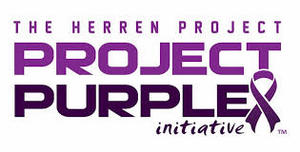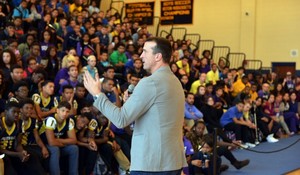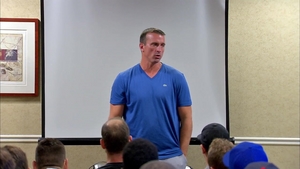This is my third interview conducted with Chris Herren in 2015. Project Purple was sweeping the country and his speaking engagements were growing beyond anyone’s wildest dreams!
A couple years have passed since I talked with former NBA Player Chris Herren. Over the past couple years, the words Herren speaks have taken on a life of their own. His message is heard loud and clear amongst many people and organizations all over the world. It was with great honour that I spoke with the man responsible for making “being yourself” a phenomena across schools everywhere.
The GM’s Perspective: Good morning Chris, it’s been some time since we last spoke, but as always, you are making differences in people’s lives. For instance, Project Purple, an initiative of The Herren Project, a non-profit foundation you have established, has taken on a life of its own. What does its feel like knowing your reach is going as far as it is?
Chris Herren: It’s one of those pinch yourself deals. For me to start Project Purple four years ago because of the courage of one child in a school assembly, to announce in front of her whole class that she was sober, the result of that is now almost half a million kids involved in the program (as of last year) is just amazing. When it comes to kids, when it comes to teenagers and students, in my opinion, they want to do the right thing. I truly believe in my heart we don’t do enough for them. We don’t give them enough options to do the right thing.

GMs: Not many people, ex-athletes in general, do this. You’re starting something special and it can only grow from here. It’s very commendable and every time I read about the good work that you’re doing, it’s awe inspiring to say the least.
CH: It has to come from the kids and that’s the beauty of it. Project Purple is alive and well in many schools I haven’t even spoke at yet. It’s not about protection, it’s about everybody. It’s very inclusive and I think that’s something we’ve lacked over the years. We have these special groups for kids in the school, but those special groups are really for kids who don’t need it. I love the fact that when you look at pictures of student groups that have adapted Project Purple, it’s a wide variety of kids in it. It’s a mixture of athletes, and drama, and music and artists, you name it and they’re in it. That’s the beauty of it.
GMs: Speaking of reaching others, your story is widely known and I just read that the “Ocean City School District anti-drug committee” has unveiled its latest billboard using your words “It’s okay to share your struggle. It’s okay to ask for help and it’s okay to change” What does that mean to you?

CH: Again, I’m extremely proud, grateful…I truly believe that we push our kids academically, we push them athletically, but we fail them socially. I don’t think we give them enough. Every time I speak to an auditorium of kids I have to let them know that it’s OK to talk. It’s OK to ask for help. It’s OK to change. It’s OK that you’ve made mistakes. They just need to know that there’s a place to talk to someone about it.
GMs: In your wildest dreams, could you ever imagine the impact you have on people’s lives?
CH: No idea. To be quite honest with you, when I filmed “Unguarded”, obviously I knew it was ESPN, but I didn’t take in to account that it would be played over and over again. I was totally naive of Amazon and Netflix and that it would be available on iTunes. I had no idea the reach that it could possibly have. My wife and I thought it would be a one-night deal and that would be it. It’s one of the proudest things I’ve ever done in my life. I truly believe it helped so many. Every time I travel to another state and meet people from treatment centers or people who work in the business, the tell me they play this video in our center and the patients really really identify with it. One of the best things to ever happen to me was to speak in the Maine State prison. Two years later, a mom brought her son who was in the Maine State prison, and she walked up to me and gave me a big hug and started crying. I had no idea why. She said standing right behind her was her son and he was there when you spoke in his prison. She said she had him back and he was sober ever since the day he walked out of there. It’s OK dealing with your past. And if you can convince people of that, there’s a lot of strength in struggle.
GMs: Last question. You see stories of highly publicized athletes continuing to struggle on and off the field. You recently spoke to the Los Angeles Kings, a club that has partnered with you/The Herren Project to talk to their players about drugs and alcohol abuse. Do you present any differently in front of your peers compared to students? How did they react to you coming in?
CH: My presentations to professional athletes, even college athletes, are different when compared to high school students. The same message is intertwined. I think when you focus on the damage that drugs can do, we want to show pictures and tell stories about how bad it gets and focus on the worst day. But, I think we’ve lost focus of the first day. I think if we’re really going to make any sort of progress with addiction/substance use we have to start emphasizing and focusing on the first day where it begins rather than focusing on how it ends. It’s really hard to for professional athletes to see themselves homeless in 20 years. It’s really hard for a high school student to see a needle in his arm in five. But they need and deserve to know how it begins and why it begins. Those are the two things that we have lacked over the last how many years when it relates to addiction or alcoholism.

To learn more, please check out Chris Herren’s Twitter and facebook accounts as well as Project Purple.




